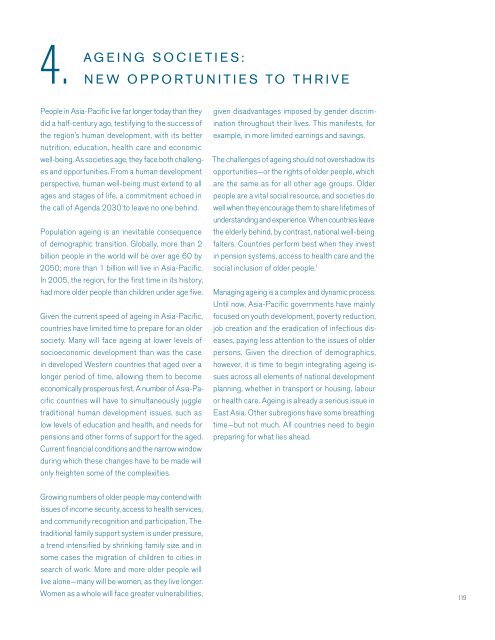SHAPING THE FUTURE HOW CHANGING DEMOGRAPHICS CAN POWER HUMAN DEVELOPMENT
1VPo4Vw
1VPo4Vw
Create successful ePaper yourself
Turn your PDF publications into a flip-book with our unique Google optimized e-Paper software.
4.<br />
AGEING<br />
SOCIETIES:<br />
NEW OPPORTUNITIES TO THRIVE<br />
People in Asia-Pacific live far longer today than they<br />
did a half-century ago, testifying to the success of<br />
the region’s human development, with its better<br />
nutrition, education, health care and economic<br />
well-being. As societies age, they face both challenges<br />
and opportunities. From a human development<br />
perspective, human well-being must extend to all<br />
ages and stages of life, a commitment echoed in<br />
the call of Agenda 2030 to leave no one behind.<br />
Population ageing is an inevitable consequence<br />
of demographic transition. Globally, more than 2<br />
billion people in the world will be over age 60 by<br />
2050; more than 1 billion will live in Asia-Pacific.<br />
In 2005, the region, for the first time in its history,<br />
had more older people than children under age five.<br />
Given the current speed of ageing in Asia-Pacific,<br />
countries have limited time to prepare for an older<br />
society. Many will face ageing at lower levels of<br />
socioeconomic development than was the case<br />
in developed Western countries that aged over a<br />
longer period of time, allowing them to become<br />
economically prosperous first. A number of Asia-Pacific<br />
countries will have to simultaneously juggle<br />
traditional human development issues, such as<br />
low levels of education and health, and needs for<br />
pensions and other forms of support for the aged.<br />
Current financial conditions and the narrow window<br />
during which these changes have to be made will<br />
only heighten some of the complexities.<br />
given disadvantages imposed by gender discrimination<br />
throughout their lives. This manifests, for<br />
example, in more limited earnings and savings.<br />
The challenges of ageing should not overshadow its<br />
opportunities—or the rights of older people, which<br />
are the same as for all other age groups. Older<br />
people are a vital social resource, and societies do<br />
well when they encourage them to share lifetimes of<br />
understanding and experience. When countries leave<br />
the elderly behind, by contrast, national well-being<br />
falters. Countries perform best when they invest<br />
in pension systems, access to health care and the<br />
social inclusion of older people. 1<br />
Managing ageing is a complex and dynamic process.<br />
Until now, Asia-Pacific governments have mainly<br />
focused on youth development, poverty reduction,<br />
job creation and the eradication of infectious diseases,<br />
paying less attention to the issues of older<br />
persons. Given the direction of demographics,<br />
however, it is time to begin integrating ageing issues<br />
across all elements of national development<br />
planning, whether in transport or housing, labour<br />
or health care. Ageing is already a serious issue in<br />
East Asia. Other subregions have some breathing<br />
time—but not much. All countries need to begin<br />
preparing for what lies ahead.<br />
Growing numbers of older people may contend with<br />
issues of income security, access to health services,<br />
and community recognition and participation. The<br />
traditional family support system is under pressure,<br />
a trend intensified by shrinking family size and in<br />
some cases the migration of children to cities in<br />
search of work. More and more older people will<br />
live alone—many will be women, as they live longer.<br />
Women as a whole will face greater vulnerabilities,<br />
119


